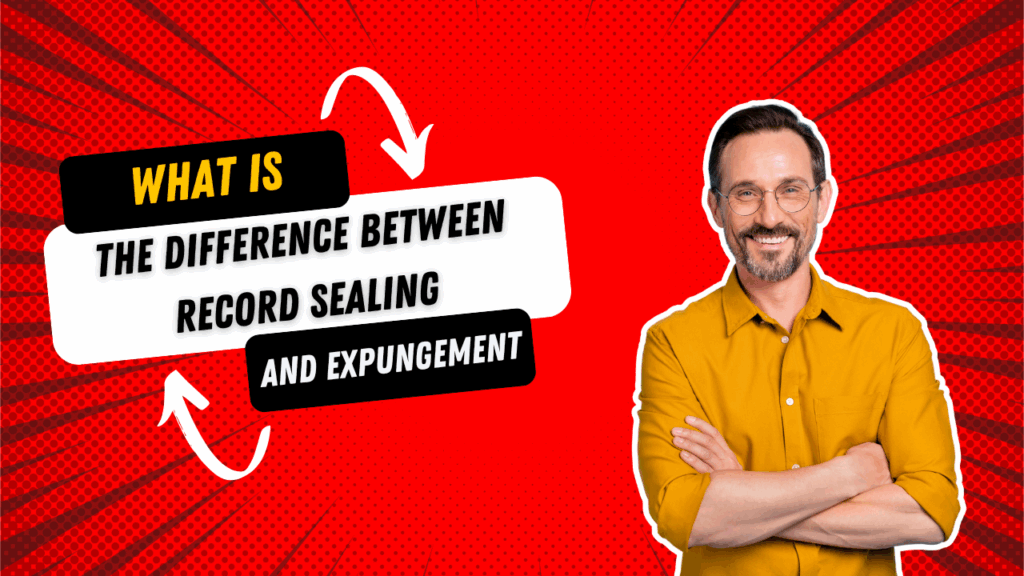You’ve probably heard the words “sealed” and “expunged” thrown around like they’re the same thing. They’re not. And if you’re trying to clear up your past, knowing the difference matters.
Let’s break it down in plain language.
Dig Deeper: How to Remove Court Records from Google Search
What Is Record Sealing?
The Basics
Record sealing means your court file is hidden from public view. It still exists. It’s just locked away from most people.
Government agencies and law enforcement can usually still see it. But the average employer or nosy neighbor won’t find it.
Sealing is like tucking your record into a drawer that most people can’t open.
Who Can See a Sealed Record?
- Police departments
- Judges
- Some licensing boards
- Immigration officials
They don’t need special permission. They just access it if they have a legal reason.
Everyone else? They’re out of luck.
What Is Expungement?
The Basics
Expungement means the record is erased like it never happened. Not hidden. Gone.
That arrest or conviction? It gets deleted from state systems. In some cases, even fingerprints and mugshots are removed.
You can legally say you were never arrested or charged. That’s a big deal.
What Gets Expunged?
It depends on the state. Some states allow expungement for:
- Non-violent offenses
- Dismissed charges
- Juvenile records
- First-time offenses
Violent crimes, DUIs, or repeat felonies? Usually off the table.
Key Differences: Sealed vs. Expunged
| Feature | Sealed | Expunged |
|---|---|---|
| Public Access | No | No |
| Police Access | Yes | Sometimes No |
| Court File Exists | Yes | No |
| You Can Deny It Happened | Usually No | Yes |
| Good for Job Apps | Yes | Even Better |
Here’s the short version:
- Sealed = Hidden
- Expunged = Gone
Why This Matters
Let’s say you’re applying for a job.
If your record is sealed, you might still have to say “yes” if they ask about it on a background check. Depends on the question.
If your record is expunged, you can usually say “no” and move on.
According to the Clean Slate Initiative, over 70 million Americans have some type of criminal record. But only a small percentage ever get records sealed or expunged.
How Do You Qualify?
Every State Is Different
Some states make it easy. Others don’t.
California, Michigan, and Utah have passed automatic record-clearing laws. In other states, you have to file a petition and maybe go to court.
Typical Requirements
- A certain amount of time has passed
- You didn’t reoffend
- You completed probation
- You paid all fines
For expungement, judges look at whether you deserve a clean slate. For sealing, it’s more about privacy.
What Can Go Wrong?
It Still Shows Up Online
Even if your case is sealed or expunged, third-party sites might still list it. Court records travel fast.
Sites like MyLife, TruthFinder, and BeenVerified scrape public data and forget to update.
You’ll have to contact them to request removal. And they won’t do it automatically.
Google May Still Index It
If the record was copied to a news site or blog before sealing or expungement, it may still show in search results.
That’s why people turn to services like Top Shelf Reputation to bury or remove those links.
Which One Should You Choose?
If You Qualify for Both
Expungement is better. Always.
It erases the record, gives you stronger legal protection, and usually gives you a better shot at jobs, housing, and school.
If Expungement Isn’t an Option
Sealing is still worth it. It keeps your record out of public view and limits what people can dig up.
Think of it as damage control.
What If You’ve Already Sealed or Expunged Your Record?
Check Yourself Online
Google your name. Add your city or the word “arrest.”
Check background sites and news articles. See what’s out there.
Use Google’s Outdated Content Tool
If a site took down your info but it still shows in search, use this tool to remove the preview.
Submit the link and tell Google the info is outdated.
Contact Third-Party Sites
Ask them to remove the record or correct their listing.
Show proof of sealing or expungement. Most will cooperate once you give them what they need.
Some may stall or ignore you. Follow up or file complaints under the Fair Credit Reporting Act.
Push Positive Results Up
Create content with your name:
- LinkedIn updates
- Blog posts
- Online bios
- Personal projects
Flood the first page of Google with stuff you control.
Final Thoughts
Sealing and expungement both help protect your privacy. But they work in different ways.
If you can expunge your record, do it. If not, sealing is the next best thing.
Either way, the job isn’t done until search engines and background sites catch up.
You worked hard to move on. Make sure your online record does too.
A reputation management service like Top Shelf Reputation can help you track, suppress, and clean up the trail so your record stays where it belongs, in the past.

